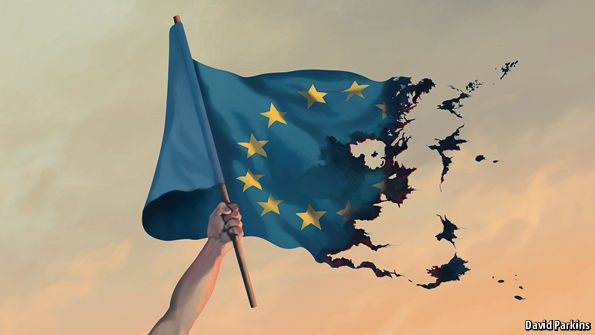In exactly one month, Britain will hold a referendum on its membership of the European Union, its first since 1975. So far, the debate on ‘Brexit’ has been risible, reflecting both the narrowness and myopia of contemporary politics, and the fact that the debate is being ‘led’ on both sides by conservatives lacking any positive vision of the future. Project Fear reigns supreme. Will your shopping be £4.32 more expensive or £3.16 cheaper if we leave? Will leaving the EU make it more or less likely that your granny will be killed by a criminal immigrant? Will leaving the EU send Britain’s ‘booming’ (!) economy into recession, or plunge Europe back into war and chaos?
This is particularly lamentable because the referendum is the most significant political decision that most British citizens will face in their lifetimes. Given the EU’s enormous influence, the referendum’s consequences will vastly outweigh that of any recent general election.

This Disorder of Things forum tries to raise the tone, offering a detailed discussion of the pros and cons of Brexit and ‘Bremain’. Importantly, on the ‘Brexit’ side, you will not find the usual patriotic bluster of spitfire nationalism, but rather a progressive case for leaving the EU. Indeed, all of our contributors engage with the truly significant political principles at stake: democracy, sovereignty, accountability, peace, security, and freedom.
Our posts will be published daily over the coming week. Links will be added when the posts go live.
Chris Bickerton kicks off the forum by arguing that today’s EU is not a powerful, supranational body but a network of states that have been transformed from ‘nation states’, deriving their authority domestically, into ‘member states’, deriving their authority from transnational, inter-elite relationships. He argues for Brexit to intensify Britain’s ‘crisis of authority’, forcing a change of political direction.
Building on Chris’s work, my own two cents follow. I suggest analysing the EU through the lens of the politics of scale and state transformation. The EU, I suggest, emerged through the rescaling of governance to inter-elite networks insulated – by design – from popular control. Restoring that control has to involve leaving the EU and revitalising national democracy in an internationalist direction.
Next, Toni Haastrup tackles the Brexiteers from a postcolonial perspective. Taking aim at the spitfire nationalism of the Brexit campaign, she argues their suggestion that UK power and influence would be revivsed by Brexit is based on wilful ignorance and delusions of imperial grandeur.
Next, Ana Juncos and Gilberto Algar-Faria argue that the UK’s security interests are best served by staying inside the EU. Brexit would only weaken the EU’s capacity to deal with the very problems that Britain is trying to escape, like irregular migration and the instability created by the Eurozone crisis.
This view is disputed by Philip Cunliffe. He offers a trenchant critique of the claim that the EU has created peace in Europe and weakening the EU will revive conflict. Nationalism and war have been elite-manufactured problems, he maintains, not the result of popular will. ‘Vote remain or return to war’ is simply blackmail from an elite that, even today, just loves warmongering.
Finally, Catherine Goetze responds to the pro-Brexit posts by warning of the dangers of restoring national democracy through a campaign led by right-wing forces. Drawing on historical parallels, she warns that Brexit might strengthen nationalism across Europe, with very negative consequences.




